Table of Contents
From Philosophy: Who Needs It
A philosophic system is an integrated view of existence. As a human being, you have no choice about the fact that you need a philosophy. Your only choice is whether you define your philosophy by a conscious, rational, disciplined process of thought... or let your subconscious accumulate a junk heap of unwarranted conclusions....
AYN RAND
AYN RANDs writings have altered and shaped the lives of millions. This selection of essays is an example of her best.
Dr. Alan Greenspan
Her essays are lively, spirited and challenging....
Best Sellers
In essay after essay her thoughts ring out in a bold and lucid prose.
Houston Post
For those who want to understand the philosophic implications of our era, this collection by Ayn Rand is an excellent place to begin.
Richmond, Virginia, News-Leader

SIGNET
Published by New American Library, a division of
Penguin Group (USA) Inc., 375 Hudson Street, New York, New York 10014, USA
Penguin Group (Canada), 90 Eglinton Avenue East, Suite 700, Toronto, Ontario M4P 2Y3, Canada (a division of Pearson Penguin Canada Inc.)
Penguin Books Ltd., 80 Strand, London WC2R 0RL, England
Penguin Ireland, 25 St. Stephens Green, Dublin 2, Ireland (a division of Penguin Books Ltd.)
Penguin Group (Australia), 250 Camberwell Road, Camberwell, Victoria 3124, Australia (a division of Pearson Australia Group Pty. Ltd.)
Penguin Books India Pvt. Ltd., 11 Community Centre, Panchsheel Park, New Delhi - 110 017, India
Penguin Group (NZ), cnr Airborne and Rosedale Roads, Albany, Auckland 1310, New Zealand (a division of Pearson New Zealand Ltd.)
Penguin Books (South Africa) (Pty.) Ltd., 24 Sturdee Avenue, Rosebank, Johannesburg 2196, South Africa
Penguin Books Ltd., Registered Offices: 80 Strand, London WC2R 0RL, England
First Printing, November 1984
Copyright Leonard Peikoff, Executor, Estate of Ayn Rand, 1982
Introduction copyright Leonard Peikoff, 1982
All rights reserved
Information about other books by Ayn Rand and her philosophy, Objectivism, may be obtained by writing to OBJECTIVISM, P.O. Box 51808, Irvine, California 92619-9930.
 REGISTERED TRADEMARKMARCA REGISTRADA
REGISTERED TRADEMARKMARCA REGISTRADA
Without limiting the rights under copyright reserved above, no part of this publication may be reproduced, stored in or introduced into a retrieval system, or transmitted, in any form, or by any means (electronic, mechanical, photocopying, recording, or otherwise), without the prior written permission of both the copyright owner and the above publisher of this book.
The scanning, uploading, and distribution of this book via the Internet or via any other means without the permission of the publisher is illegal and punishable by law. Please purchase only authorized electronic editions, and do not participate in or encourage electronic piracy of copyrighted materials. Your support of the authors rights is appreciated.
eISBN : 978-1-101-13770-3
http://us.penguingroup.com
Introduction
Ayn Rand was not only a novelist and philosopher; she was also a salesman of philosophythe greatest salesman philosophy has ever had.
Who else could write a Romantic best seller such as Atlas Shrugged in which the heroes and the villains are differentiated fundamentally by their metaphysics; in which the wrong epistemology is shown to lead to train wrecks, furnace breakouts, and sexual impotence; in which the right ethics is shown to be the indispensable means to the rebuilding of New York City and of mans soul? Who else could write a book called Philosophy: Who Needs It and have an answer to offer?
Ayn Rands power to sell philosophy is a consequence of her particular philosophy, Objectivism.
... I am not primarily an advocate of capitalism, but of egoism, she wrote a decade ago; and I am not primarily an advocate of egoism, but of reason. If one recognizes the supremacy of reason and applies it consistently, all the rest follows. Thisthe supremacy of reasonwas, is and will be the primary concern of my work, and the essence of Objectivism. ( The Objectivist, September 1971.)
Reason, according to Objectivism, is not merely a distinguishing attribute of man; it is his fundamental attributehis basic means of survival. Therefore, whatever reason requires in order to function is a necessity of human life.
Reason functions by integrating perceptual data into concepts. This process, Ayn Rand holds, ultimately requires the widest integrationsthose which give man knowledge of the universe in which he acts, of his means of knowledge, and of his proper values.
Man, therefore, needs metaphysics, epistemology and ethics; i.e., he needs philosophy. He needs it by his essential nature and for a practical purpose: in order to be able to think, to act, to live.
In todays world, this view of the role of philosophy is uniquejust as, in todays neo-mystic culture, Objectivisms advocacy of reason is all but unique.
To Ayn Rand, philosophy is not a senseless parade of abstractions created to fill out the ritual at cocktail parties or in Sunday morning services. It is not a ponderous Continental wail of futility resonating with Oriental overtones. It is not a chess game divorced from reality designed by British professors for otherwise unemployable colleagues. To Ayn Rand, philosophy is the fundamental factor in human life; it is the basic force that shapes the mind and character of men and the destiny of nations. It shapes them for good or for evil, depending on the kind of philosophy men accept.
A mans choice, according to Ayn Rand, is not whether to have a philosophy, but only which philosophy to have. His choice is whether his philosophy will be conscious, explicit, logical, and therefore practicalor random, unidentified, contradictory, and therefore lethal.
In these essays, Ayn Rand explains some of the steps necessary to achieve a conscious, rational philosophy. She teaches the reader how to identify, and then evaluate, the hidden premises at work in his own soul or nation. She makes clear the mechanism by which philosophy rules men and societies, the forms that abstract theory takes in daily life, and the profound existential consequences that flow from even the most abstruse ideas, ideas which may seem at first glance to be of merely academic concern. She shows that, when an idea is rational, its consequence, ultimately, is the preservation of mans life; and that when an idea is irrational, its consequence is the opposite.
Contrary to the injunctions issued to men for millennia, Ayn Rand did not equate objectivity with disinterest; she was interested in philosophy, in the Objectivist sense of self-interest; she wantedselfishly, for the sake of her own actions and lifeto know which ideas are right. If man needs philosophy, she held, he needs one that is true, i.e., in accordance with reality.
Philosophy: Who Needs It is the last work planned by Ayn Rand before her death in March of this year.
The book was first suggested by a Canadian Objectivist, Walter Huebscher. In the fall of 1981, he wrote to Miss Rand: In [your articles], you detail dramatically how everyone, through each statement he makes, uses philosophical premises.... If [such] articles were published in a single volume, I believe that it would focus direct attention on philosophys powerful influence, identify the philosophical roots of some of todays most dangerous trends, [and] indicate that it is possible to reverse a cultural trend, that everyone can and should get involved in doing just that.
Next page
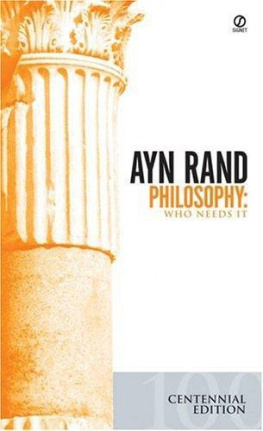
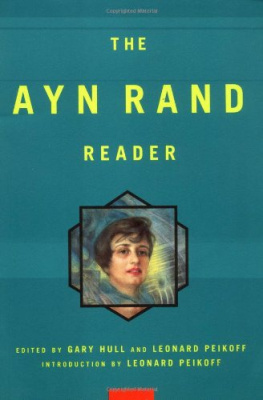
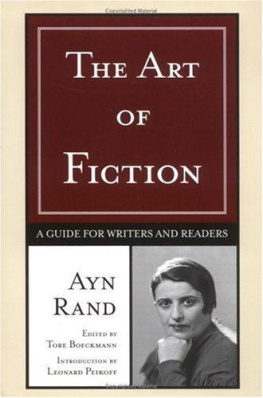
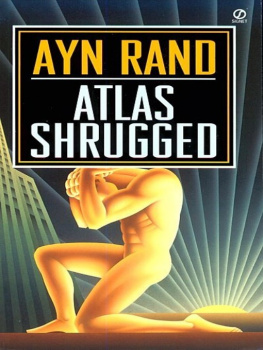
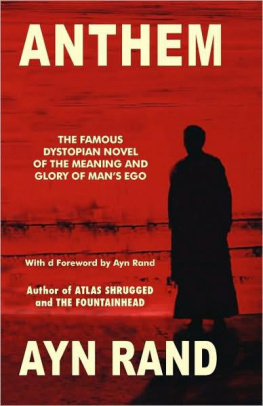
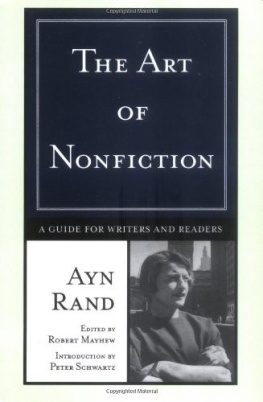

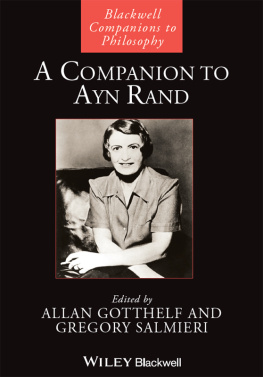
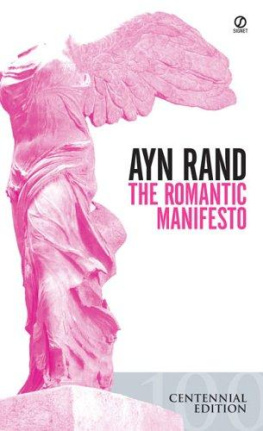
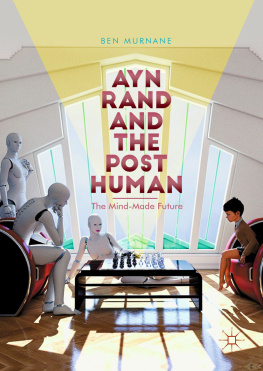
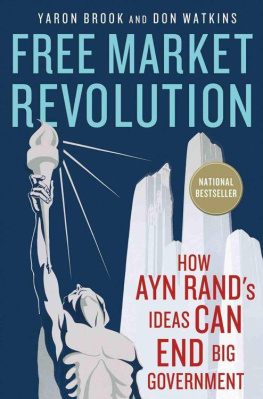
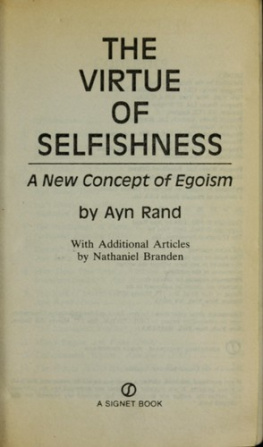

 REGISTERED TRADEMARKMARCA REGISTRADA
REGISTERED TRADEMARKMARCA REGISTRADA